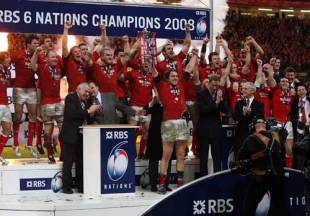|
Comment
Can Wales live with favourites tag?
Huw Richards
January 27, 2009

Can Wales defy history and claim back-to-back Grand Slams?
© Getty Images
Enlarge
Rarely in recent times has the word 'unprecedented', when applied to Welsh rugby, been followed by anything you would wish with which to be associated. Warren Gatland's squad, though, go into the 2009 Six Nations championship seeking to set a positive precedent. Only one Welsh team has ever clinched consecutive Grand Slams - an achievement completed exactly a century ago when Billy Trew's 1909 team followed the first ever Grand Slammers of a year earlier. Some great teams have followed, but none have matched them. The prize for the greatest disappointment is divided between the 1951 team, who went down to a staggering 19-0 defeat at Murrayfield after looking every inch champions in an opening day massacre of England and the men of 1972, done in by the political decision not to travel to Dublin after winning their first three matches. The 1977 and 1979 contenders went down to extremely powerful French teams in Paris while some of us are still trying to forget what happened in 2006 - that the Ospreys seem to be trying to appoint Scott Johnson suggests some people in Wales really have forgotten. Were Gatland's team to bring it off, there is little doubt their feat would be greater than that of their 1909 predecessors. There is an extra match to win - before anyone suggests that beating Italy is a formality, let them remember what happened in Rome two years ago - and nobody now is remotely as weak as the French were in their earliest days. History, never mind any other consideration, shows that it is tough to repeat. Nobody has ever won consecutive five-match Slams. There were only five two-in-a-rows in the days when it took four wins - that opening double by Wales, a trio (1913-14, 1923-24, 1991-92) by England and France's 1997-8 Chelems. There are reasons for believing it possible. It could be argued that 2005 was a glorious fluke. A second Slam achieved by many of the same players - friendlies apart, Gavin Henson has played in nothing else - suggests strongly that it was not. The style of the 2008 triumph appears more sustainable, Welsh performances in the Heineken have improved and other contenders look to be in decline, transition or confusion. All of which contains the danger of getting ahead of themselves. If Wales can undergo a dramatic transformation in fortunes, so can other teams. A championship or Triple Crown might be seen as a disappointment, a ludicrous thought in the light of most recent history. A sense of well-being can evaporate on a single afternoon. We will know much more after Wales have visited Murrayfield on February 8. No venue is more associated with Welsh disappointment. The memory remains acute both of Graham Henry's first Five Nations team being sent resounding home to think again in 1999 and of one of the most gruesome displays of recent seasons on the last visit two years ago. Wales have won there once since 1997.
Scotland have, as ever, limited resources, but could be on the way up. They can field two of the likely Lions Test front row, a decent line-out and the usual ruggedly effective back-row along with, in Mike Blair, the northern hemisphere's form scrum-half. A win at Murrayfield would be more than the first step towards a Triple Crown which might be completed without again leaving Cardiff. Wales have not won an away match, except in the two Grand Slam years, since 2001. Winning would not necessarily presage another Slam, but is a significant indicator of well-being. France, as ever, looms as a giant obstacle but the Stade has some claim to be Wales's favourite ground, with three wins out of five there since 1999. Reasons to be cheerful? Much of the above, plus the element of renewal offered by the Cardiffian trio of Andy Powell, Leigh Halfpenny and Jamie Roberts. Reasons to be wary? Ryan Jones's variable form, Martyn Williams's age, the line-out in all of its dimensions, Lee Byrne's fitness, issues of selection, decision-making and goal-kicking at half-back and the knowledge that Shane Williams must at some point revert to human form. Any of these might become a factor. Warren Gatland and Shaun Edwards had an answer to every eventuality last year. Can they be as pitch-perfect again?. I heard or read over the weekend the statement that Wales do not like being favourites. Given that they have not been title favourites during the lifetime, never mind the playing careers, of most of their players, this looks more Anglocentric preconception about emotional Celts than evidence-based analysis, but even if true it can be lived with. If being favourites really is a worry, it is a huge improvement on pretty much everything else that has troubled Welsh rugby over the last quarter of a century or so. © Scrum.com
| |||||||||||||||
Live Sports
Communication error please reload the page.
-
Football
-
Cricket
-
Rugby
-
- Days
- Hrs
- Mins
- Secs
F1 - Abu Dhabi GP
Abu Dhabi Grand Prix December 11-131. Max Verstappen ()
2. Valtteri Bottas (Mercedes)
3. Lewis Hamilton (Mercedes)
4. Alexander Albon ()
5. Lando Norris ()
6. Carlos Sainz Jr ()
-
ESPNOtherLive >>
Boxing - Nelson v Wilson; Simmons v Dickinson; Joshua v Gavern (Metro Radio Arena, Newcastle)
Golf - Houston Open
Snooker - China Open
Tennis - Miami Open

